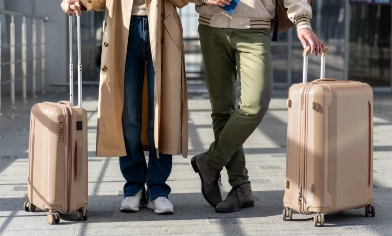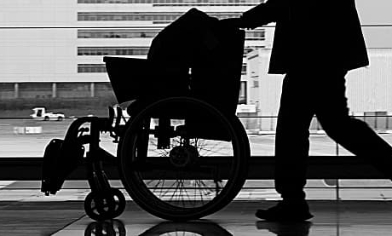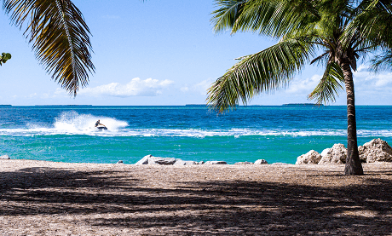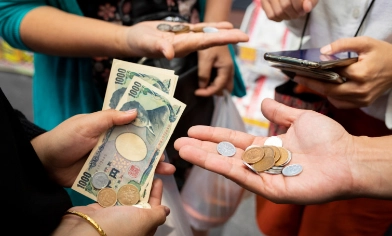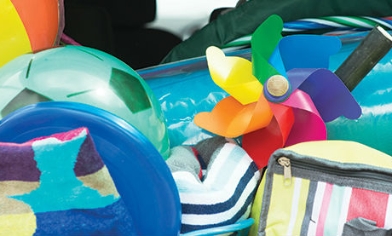1. Set a realistic budget
Setting a realistic budget for your travels can help keep your spending on track and cover essentials, such as food and drink, getting around and finding places to stay. But it could also leave a little wiggle room for unexpected costs, from replacing a lost phone to splashing out on a spontaneous activity.
First, start by researching costs in the countries you plan to visit. Consider common items or services tourists could expect to pay for when visiting, as well as day-to-day living costs if you’ll be staying a while. Check travel blogs, forums and budget travel websites. And read our annual travel money reports to help understand costs in different destinations:
- Holiday Money Report: Find out which destinations around the world offer UK holidaymakers the best value for money
- Long Haul Holiday Report: Discover where your travel funds will go further in far-flung destinations
- City Cost Barometer: Break down the cost of a city break in various European cities
- Family Holiday Report: Get an insight into best-value destinations for families
- Ski Resorts Report: Extending your trip into ski season? Here's how to make the most of your budget
Make sure you factor in the cost of flights, trains, buses and other types of transport. It's also a good idea to budget a little extra for delayed flights, missed connections or last-minute changes. Then, look at the different kinds of accommodation available, work out the cost and see what you can afford.
Finally, tally up what you might need to spend on food and drink, activities and local transport in the places you want to visit. You'll soon get an idea of your daily expenses and be able to create a budget.
2. Check if your passport’s valid
The last thing you want is to plan your trip and then realise your passport is out of date. So, make sure yours is valid for the entire time you’re away.
This includes checking how long you’ll need left on your passport to meet the entry requirements for different destinations. These can vary by country. Find out more about passport validity requirements on the Foreign, Commonwealth and Development Office travel advice page.
If you need to renew your passport, you can do it with confidence using the Check & Send service at your local Post Office branch. It will help you get your application right first time, reducing the time needed to process it.
If you need to renew your UK passport urgently, you can use faster services. But remember, these cost more than the standard fee. You’ll also need to book an appointment at a passport office, and spots can fill up fast depending on where you are and how busy it is.
3. Take out travel insurance
Taking out travel insurance can offer cover if you get sick, your flights get cancelled or your stuff gets lost or stolen – just check your policy for the terms and conditions. Explore different policy types and cover levels to find those that best suit your needs and budget for the extended trips you’re taking.
Options to consider include:
- Backpacker policy: Designed for long-term travellers, a backpacker policy can cover you for over a year or several months. It could be ideal if you’re visiting multiple countries or living abroad for some time
- Annual multi-trip cover: Planning to take lots of different trips? This type of policy provides cover for as many trips as you want to take in a year, but check for any individual trip limits
- Single-trip travel insurance: If you're planning on taking one long trip during your gap year or career break, this type of policy might provide the cover you need, depending on how long you’re away
If you want to be covered in case your plans change, you might be able to extend your existing policy. This will depend on the type of policy you have, and you might have to arrange the extension before you travel, so always check with your insurer. You’ll have to pay a little extra and there are set limits for how long you can extend your trip.
It’s also important to consider any extra cover you’ll need for items you’ll be taking, activities you’ll be doing, destinations you’ll be visiting and other possibilities. For example, you may be able to add cover for gadgets and devices, skiing and other winter sports or natural catastrophes, terrorism and other trip disruptions.
4. Plan your accommodation in advance
Booking your accommodation ahead of time can help make your travels more affordable and stress-free. Early booking could also mean you can secure rates and have a wider selection of options to choose from. Platforms like Airbnb, Hostelworld, and Booking.com offer a range of choices, from unique home rentals to friendly hostels. Some might even come with early bird discounts. Not only can this help stretch your budget further, but you’ll also have a comfortable place to stay and have more time to enjoy your adventures.







